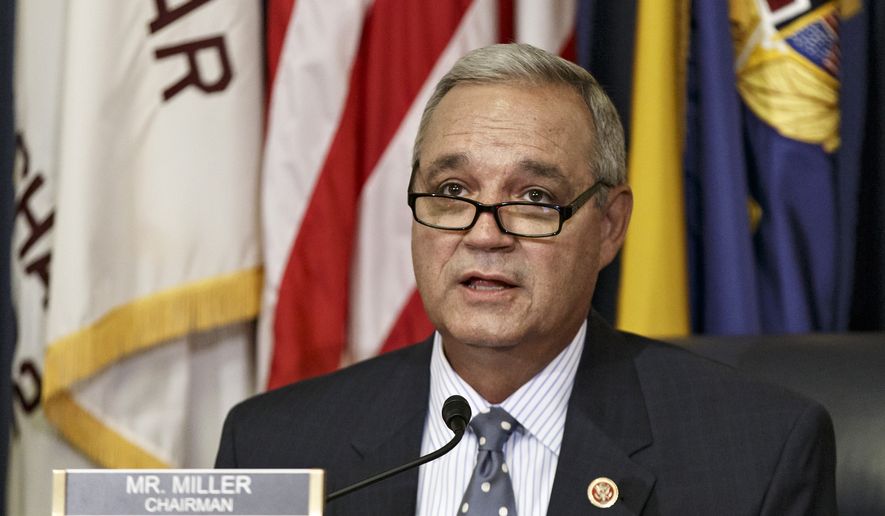The chairman of the House Veterans’ Affairs Committee said Thursday the VA has failed in its promise to fire employees responsible for veterans dying while waiting for care, and he said he will introduce a new bill to force more accountability on the troubled department.
Rep. Jeff Miller, Florida Republican, said the Department of Veterans Affairs hasn’t made use of the new firing authority Congress granted it just a few months ago in a law that was supposed to help the department get rid of employees who cooked the books and created unreasonably long wait times for veterans.
But instead of following the law, Mr. Miller said the VA is giving employees five days’ notice before discipline, which gives them a chance to challenge the discipline. Some senior employees are using the advance notice to retire before they can be fired, meaning they continue to collect a pension and benefits at taxpayer expense.
“These questionable actions are nowhere to be found in the law we wrote and the president signed,” Mr. Miller said at a hearing. “In my view, the five-day advance notice of removal only serves to incentivize poor-performing senior leaders to drag out the disciplinary process while continuing to collect a hefty paycheck before ultimately retiring with full benefits.”
Mr. Miller said he plans to introduce a bill that would allow the secretary to decrease an employee’s pension based on how many years the employee participated in the fireable offenses.
A similar system already exists in the military. Brig. Gen. Jeffrey Sinclair, the Air Force officer accused of sexual assault earlier this year, for example, will receive the retirement of a lieutenant colonel, the last rank at which he served honorably.
SEE ALSO: Obamacare’s small-business enrollment slow: Government auditors
Deputy VA Secretary Sloan Gibson said the department is providing the five-day notice to give employees time to respond to charges — something lawyers say the department is required to do.
Mr. Gibson said that by following all the proper protocols and taking the time to collect evidence, the department can be sure that punishments or firings will stick even on appeal.
“The case law is very clear about providing a federal employee an opportunity to respond to charges,” Mr. Gibson said.
If charges were overturned, an employee would get his or her job back and could also be owed back pay and legal expenses — neither of which are a good use of taxpayer money, Mr. Gibson said.
Mr. Gibson said he’s eager to work with Congress to implement the law passed this summer, which in addition to the firing authority gives some veterans the chance to skip wait lines and get care at private clinics.
But to properly implement the law, Mr. Gibson said the department needs another $400 million, on top of the $5 billion Congress authorized in the law.
SEE ALSO: HHS panel OKs 1-year deferral for gay, bisexual males to give blood
Mr. Gibson said the new law only shortens the time to appeal any disciplinary action, but doesn’t allow senior employees to be fired “at will” or get rid of the appeals process.
Lawmakers, though, said they think the VA can move faster.
“How could the law be any more clear than someone, as long as poor performance has been documented, can be removed by the secretary without a notice period?” said Rep. Doug Lamborn, Colorado Republican. “How can we make the law more clear than it already is?”
Lawmakers also said they fear the VA won’t punish everyone involved in the waitlists scandal.
VA Secretary Bob McDonald has sent Congress a list of more than 5,000 employees he wants to discipline, and 1,000 he wants to fire. But Mr. Miller said only 42 of those are tied to the waitlist scandal.
“I do not understand, in the wake of the biggest scandal in VA’s history, how only 42 employees … have been proposed for discipline with none yet removed,” Mr. Miller said.
Many members of the committee said veterans are still facing trouble getting care, recounting stories they heard while they were back home over the last two months. One lawmaker recounted a veteran who waited 75 days for an appointment only to be diagnosed with prostate cancer at an outside facility.
Mr. Miller said the VA leadership and their advisers must be confused about how the law should be implemented. He cautioned Mr. Gibson to not make the same mistakes as former Secretary Eric Shinseki, who stepped down in May amid the developing scandal that data manipulation and secret waitlists were widespread throughout the department.
“I have an increasing worry that Secretary McDonald and you are getting bad advice from some of those around you within VA’s bureaucracy,” Mr. Miller said. “This is the same issue that I believe doomed Secretary Shinseki’s tenure and I hope you take my suggestion seriously when I tell you that VA’s entrenched bureaucracy must be shaken up.”
• Jacqueline Klimas can be reached at jklimas@washingtontimes.com.




Please read our comment policy before commenting.